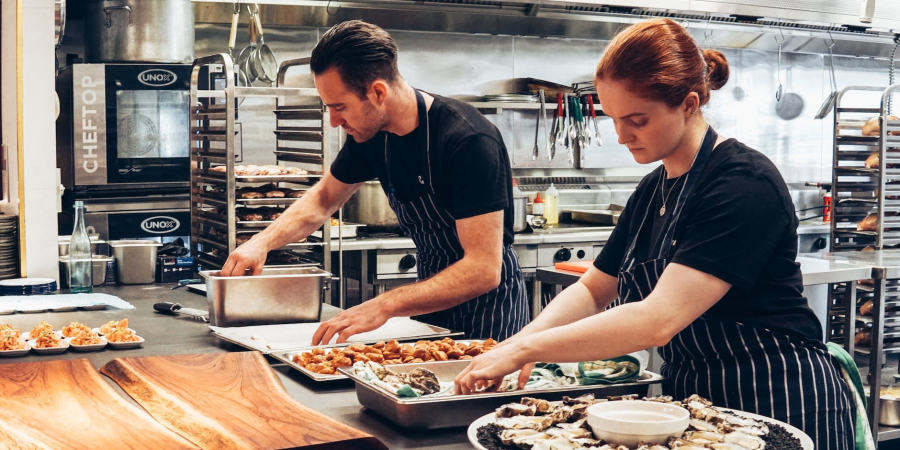

Cooking is something I adore doing. This is something I've been telling myself a lot lately. I even hum the phrase's iambic, percussion-like rhythm as I rattle through the cabinets trying to find the skillet that always seems to be at the bottom of the teetering stack of pans, or wedge the knife blade between the stalks of yet another head of celery, or hurl a handful of salt at an innocent-looking chicken. Theoretically, I'd love to cook.
As a home cook, cooking entails planning, shopping, storing, preparing, combining, heating, and serving in addition to actual cooking. Even if I don't always adore all those things, I can always count on a shock I admit to feeling a certain exhilaration at the prospect of a significant change in the rules of the kitchen game along with the expected fear and anger in March, when it started to appear plausible that the coronavirus epidemic would result in a serious bunker-style hiding out. When you're not sure how frequently you'll be able to shop for groceries, how do you make it work? I had spoken to a couple in Shunde, China, in early February for a story. They had managed to create culinary sestinas during a strict lockdown with limited access to fresh ingredients; I took their lead and began growing my own herbs in the weeks leading up to New York City's own social-distancing orders. I also purchased jars in which
Naturally, it is not the way events transpired. It was evident almost immediately that there was little reason to be concerned about significant interruptions to the supply chain, save from a few unstable weeks of toilet paper shortages. In fact, as the country's restaurants were forced to close due to state and local regulations, their suppliers began frantically trying to sell their now-homeless inventory at retail, and frequently by mail, so by April, home cooks (or at least those whose incomes hadn't evaporated when the country started its economic domino-fall) had access to more and better ingredients than we've ever had. Once-destined for steak establishments, rare and beautiful breeds of poultry, stunning cheeses, freshly ground flours, excellent olive oils and vinegars by the gallon, and an eye-dazzling array of specialized fruits and vegetables—the kinds of rare and delicate
Fritto misto; I’ve prepared hundreds of dishes for hundreds of meals; I spent the summer slicing fish and juicing limes for a ceaseless procession of acidic, airy ceviches. I’m also really bored. I’m really worn out. Theoretically, I’d love to cook. However, I’m so over cooking.
Knowing that I’m not alone in feeling this way gives me some comfort. My friend Sarah recently told me, “I hate that I hate cooking, and I hate that I hate cooking,” following months of preparing and eating meals on her alone as her spouse works a schedule that, because of COVID-19, means he is never home for mealtimes. According to a recent Quartz analysis, rising sales of prepared foods indicate that covid-related kitchen
screenshots folder, and on my heart), which circulated among my friends. The Twitter user stated that she had "gotten to the point with eating where i basically just want a nutrient slurry injected into me."
It's normal—even expected—to feel empty during stressful and uncertain times. "Stress and uncertainty," with its million and a half ambient and immediate dysregulations, is, at most, a tiptoeingly courteous way to characterize the experience of the previous year in America. However, shouldn't cooking be a salve for situations like this? Even when cooking turned into a sort of job, a big part of my satisfaction stemmed from how concrete the process and the results were. Kneading is one of those easy, repetitive, semi-creative chores.
are meant to provide us a sense of power and control over the tiny universe of the stovetop and cutting board, to root us in the tangible world, and to defrost us when we're frozen with existential dread. This makes sense, I'm sure it's true, and I suppose I can recall experiencing and accepting it. However, it seems so far away these days. I want to completely lose myself in a battle-strategy video game where I get to be a military-school professor with magical powers and green hair, not re-center myself by being mindful while peeling a head of garlic for the hundred and thirtyth day in a row
Small beans, compared to, well, everything, this culinary anhedonia problem. (I’ve been reminding myself to start soaking some beans every day for the past week. No beans have been soaked by me.) However, it feels even more acute as Thanksgiving approaches, a day that has come to depend on the horrifying idea that a home-cooked meal is necessary and that the preparation of it should be labor-intensive and done without complaint. This is untrue any year—not only is it acceptable to skip the turkey, but it’s also acceptable to attempt and then fail, hire someone else to prepare the feast, or refuse the celebration entirely. This year, as the COVID-19 outbreak continues to expand uncontrolled.
